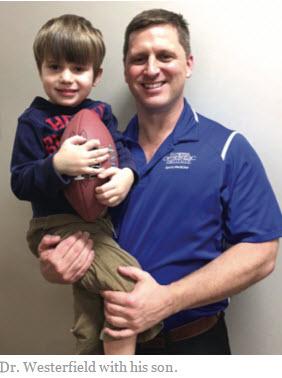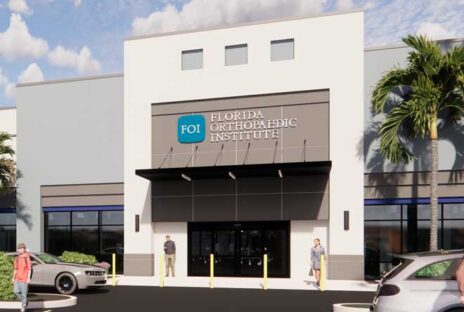Meet Florida Orthopaedic Institute’s sports medicine team

Will Smith’s latest film “Concussions” brought a serious problem to light for professional athletes, but what happens when your son or daughter experiences a head injury?
For Austin Hubbard “Concussions” was a real-life experience. During a Plant High School baseball game, the 17-year-old collided with another player in the outfield and was seriously injured. As the other player raced to catch the ball, his mouth hit Austin’s jaw and Austin’s face was badly torn up. Not only did Austin need surgery and stitches to repair his jaw, but he also sustained a severe concussion.

A neurologist recommended that Austin and his family see Dr. Westerfield, a concussion expert and sports medicine physician from Florida Orthopaedic Institute. Austin was seen immediately and began his evaluation and treatment for his concussion symptoms.
Using new computer software, ImPACT, Dr. Westerfield tested Austin’s memory, attention span, brain processing speed and reaction time to measure his post-injury symptoms and diagnose him properly.
“Unlike most orthopedic injuries, you cannot always see the damage that has been done to the brain using an X-ray or CT scan,” says Dr. Westerfield. “Doctors who are certified in ImPACT can evaluate the extent of the injury and we also can create a customized treatment plan for the individual.”
ImPACT can help answer difficult questions about an athlete’s readiness to return to play, protecting them from the serious consequences of returning too soon, which helped Austin’s mother feel better about his return to baseball. While traditional neurological and radiologic procedures such as CT, MRI and EEG are helpful in identifying many serious concerns such as skull fractures, hematoma and contusions, they are not as useful in identifying the effects of concussion.
“The ImPACT testing made me more comfortable and open to sending Austin back into the game only when I knew for sure that he was ready,” says Mrs. Hubbard. “I also appreciated Dr. Westerfield’s concern and patience with Austin. He answered all my questions and made sure that Austin did not get back onto the field before he was ready.”
Submitted in 17 local schools, and they provide a physician on the sidelines at all high school games. This way, student athletes receive the same quality of care as the professional athletes that they aspire to be.
Common signs and symptoms of concussions include: headache, temporary loss of consciousness, confusion, dizziness, nausea, fatigue and sensitivity to light and noise.
Dr. Westerfield notes, “If you or someone you know experiences these symptoms after head trauma, the best chance for a safe recovery is to take them to a concussion specialist, and if available in your area, an orthopedic urgent care facility is best.”
Florida Orthopaedic Institute’s urgent care centers (located in Citrus Park and South Tampa) provide the community with highly trained orthopedic physicians for emergency care. This way, if injury occurs, patients can avoid long lines at emergency rooms and see a doctor with expertise in orthopedics, sports medicine and concussions.
“I feel better knowing more about concussions because of this experience. I know more now so I can better protect myself and recognize the symptoms in myself and my teammates, and now I know where to go for help too,” said Austin.
You can visit Florida Orthopaedic Institute’s Citrus Park location at 6117 Gunn Highway or visit the website FloridaOrtho.com for more information on Florida Orthopaedic Institute’s Sports Medicine Team.
Florida Orthopaedic Institute’s offices are open Monday-Friday from 8:00 AM to 5:00 PM and Saturday mornings for MRIs. Call 1 (800) FL-ORTHO to make an appointment or talk to a staff member of Florida Orthopaedic Institute’s Sports Medicine Team.
May 17, 2016


